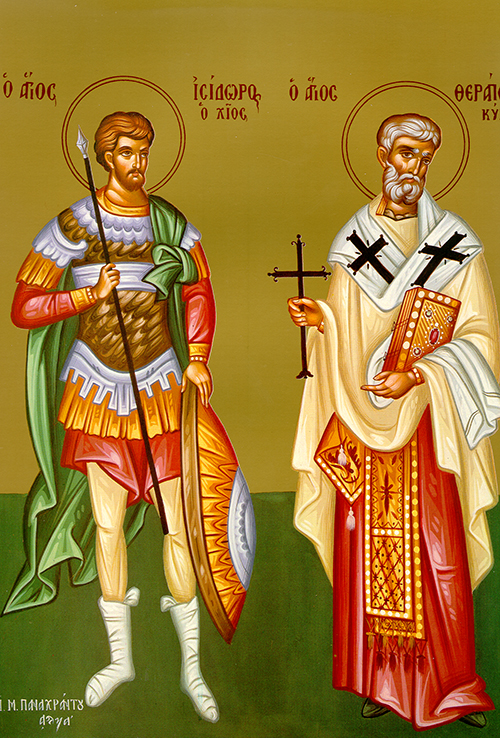

The holy martyr Isidore was an officer in the Roman Navy in the third century. Once it was discovered that he was a Christian, St. Isidore’s admiral urged him to renounce Christ and made sacrifice to the idol, but St. Isidore refused saying, “You may be able to kill my body, but you have no power over my soul. The true, living God, Jesus Christ, abides in me; even after my death he shall be with me, and I with Him. I shall abide in Him, and I shall never cease to confess Him while breath still remains in my body.” He was tortured after his refusal, and thrown in prison. His own father even tried to convince him to deny Christ, yet St. Isidore’s faith remained unshaken. Despite his tongue being cut out to prevent his proclamations, St. Isidore continued to confess Christ through his tortures until the point he was finally beheaded. His body was retrieved from the well where it was thrown by Saints Ammonios and Myrope, who buried him in secret with all due honor. St. Myrope was buried alongside St. Isidore on the Greek island of Chios.
O Lord our God, your holy martyr Isidore has deserved the crown of immortality on account of his good fight. Armed with your strength, he has vanquished his persecutors and crushed Satan’s dreadful might. Through his supplications, O Christ our God, save our souls.
O glorious Isidore, through your constant prayers to God, you became a leader in the world and a martyr holy in spirit. Therefore, we sing hymns of praise to you.
Acts 14: 6-18
In those days, Paul and Barnabas fled to the Lycaonian towns of Lystra and Oebre and to the surrounding country, where they continued to proclaim the good news.
At Lystra there was a man who was lame from birth; he used to sit crippled, never having walked in his life. On one occasion he was listening to Paul preaching, and Paul looked directly at him and saw that he had the faith to be saved. Paul called out to him in a loud voice, “Stand up! On your feet!” The man jumped up and began to walk around. When the crowds saw what Paul had done, they cried out in Lycaonian, “Gods have come to us in the form of men!” They named Barnabas Zeus; and Paul they called Hermes, since he was the spokesman. Even the priests of the temple of Zeus, which stood outside the town, brought oxen and garlands to the gates because he wished to offer sacrifice to them with the crowds.
When the apostles Barnabas and Paul heard of this, they tore their garments and rushed out into the crowds. “Friends, why do you do this?” they shouted frantically. “We are only men, human like you. We are bringing you the good news that will convert you from just such follies as these to the living God, ‘the one who made heaven and earth and the sea and all that is in them.’ In past ages he let the Gentiles go their way. Yet in bestowing his benefits, he has not hidden himself completely, without a clue. From the heavens he sends down rain and rich harvests; your spirit he fills with food and delight.” Yet even with a speech such as this, they could scarcely stop the crowds from offering sacrifice to them.
John 7: 14-30
At that time the feast of Tabernacles was half over by the time Jesus went into the temple area and began to teach. The Jews were filled with amazement and said, “how did this man get his education when he had no teacher?”
This was Jesus‘s answer: “My doctrine is not my own; it comes from him who sent me. Any man who chooses to do his will will know about this doctrine – namely, whether it comes from God or is simply spoken on my own. Whoever speaks on his own is bent on self-glorification. The man who seeks glory for him who sent him is truthful; there is no dishonesty in his heart. Moses has given you the law, has he not? Yet not one of you keeps it. Why do you look for a chance to kill me?”
“You are mad!” The crowd retarded. “Who wants to kill you?” Jesus answered: “I have performed a single work and you profess astonishment over it. Moses gave you circumcision though it did not originate with Moses but with the patriarchs. And so, even on a Sabbath you circumcise a man. If a man can be circumcised on the sabbath to prevent a violation of Mosaic law, how is it that you are angry with me for curing a whole man on the Sabbath? Stop judging by appearances and make an honest judgment.”
This led some of the people of Jerusalem to remark: “Is this not the one they want to kill? Here he is speaking in public and they don’t say a word to him! Perhaps even the authorities have decided that this is the Messiah. Still, we know where this man is from. When the Messiah comes, no one is supposed to know his origins.”
At this, Jesus, who was teaching in the temple area, cried out: “So you know me, and you know my origins? The truth is, I have not come of myself. I was sent by One who has the right to send, and him you do not know. I know him because it is from him I come: he sent me.”
At this they tried to see him, but no one laid a finger on him because his hour had not yet come.
Icon courtesy of Jack Figel, Eastern Christian Publications – ecpubs.com
Tuesday, May 13 –